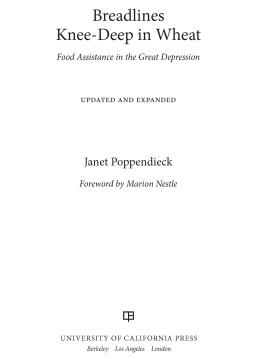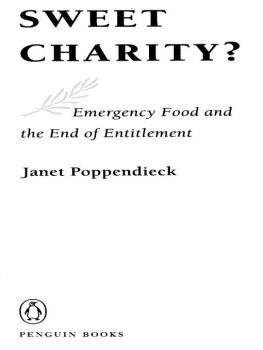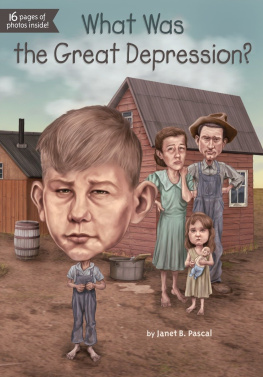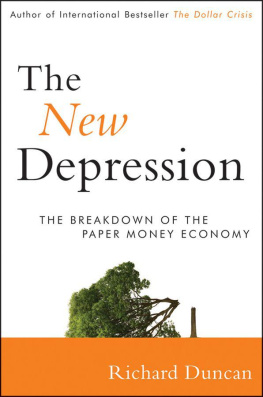Breadlines
Knee-Deep in Wheat
Food Assistance in the Great Depression
UPDATED AND EXPANDED
Janet Poppendieck
Foreword by Marion Nestle

UNIVERSITY OF CALIFORNIA PRESS
Berkeley Los Angeles London
The following publishers have generously given permission to usequotations from copyrighted works: From The Grapes of Wrath by JohnSteinbeck. Copyright 1939 by Viking Penguin, Inc., renewed 1967by John Steinbeck. From The People, Yes by Carl Sandburg. Copyright 1936 by Harcourt Brace Jovanovich, Inc., renewed 1964 by CarlSandburg. The Oral History Research Office of Columbia University hasgranted permission for use of quotations from copyrighted oral histories inits possession.
University of California Press, one of the most distinguished universitypresses in the United States, enriches lives around the world by advancingscholarship in the humanities, social sciences, and natural sciences. Itsactivities are supported by the UC Press Foundation and by philanthropiccontributions from individuals and institutions. For more information,visit www.ucpress.edu.
University of California Press
Berkeley and Los Angeles, California
University of California Press, Ltd.
London, England
2014 by The Regents of the University of California
1st printing 1986 by Rutgers, The State University
ISBN 978-0-520-27753-3 (cloth)
ISBN 978-0-520-27754-0 (paper)
ISBN 978-0-520-95842-5 (ebook)
The Library of Congress has cataloged an earlier edition of this book asfollows:
Library of Congress Cataloging-in-Publication Data
Poppendieck, Janet, 1945
Breadlines knee-deep in wheat
Bibliography: p.
Includes index.
1. Food reliefUnited StatesHistory. 2. Depressions1929UnitedStates. 3. Agriculture and stateUnited StatesHistory.
I. Title.
HV696.F6P66 1986
363.8'83'0973
ISBN 0-8135-1121-6 | 852175 |
For my parents
Men who can graft the trees and make the seed fertile and big can find noway to let the hungry people eat their produce. Men who have creatednew fruits in the world cannot create a system whereby their fruits may beeaten.... The works of the roots of the vines, of the trees must bedestroyed to keep up the price, and this is the saddest, bitterest thingof all.... A million people hungry, needing the fruitand kerosenesprayed over the golden mountains.
There is a crime here that goes beyond denunciation. There is a sorrowhere that weeping cannot symbolize. There is a failure here that topplesall our success. The fertile earth, the straight tree rows, the sturdy trunks,and the ripe fruit. And children dying of pellagra must die because aprofit cannot be taken from an orange. And coroners must fill in thecertificatedied of malnutritionbecause the food must rot, must beforced to rot.
John Steinbeck
The Grapes of Wrath |
CONTENTS
FOREWORD
What a gift to have this new edition of Breadlines Knee-Deep in Wheat,too long out of print and badly missed. Janet Poppendieck and I exchangedbooks when we first met, in the late 1980s, and I still treasure the signedcopy she gave me, even with its water stains from hurricane damage to myNew York University office some years ago. Brought up to date with itsenlightening new epilogue, her book could not have arrived at a moretimely moment. As I write these words, the government is still recoveringfrom the effects of a sixteen-day shutdown caused by Tea Party Republicanswho believe that federal authorities should have no role in health care,let alone in food assistance to the poor.
Food assistance is what this book is about. Breadlines tells the story ofhow the U.S. government, confronted with destitution during the GreatDepression of the 1930s, first became involved in feeding the hungry.Government agencies attempted to resolve two pressing social and politicalproblems with one stroke: breadlines, the great masses of people inunemployment-induced poverty who queued up for handouts of free food,and knee-deep in wheat, shorthand for the great bounty of Americanagriculture that was available at the time but unaffordable and allowed to rotor intentionally destroyed. The solution: distribute surplus commodities tothe poor while alsoand politically far more importantprovidingfarmers with a paying outlet for what they produced. The earlier chapters ofBreadlines focus on the politicsas played out in disputes betweenmembers of the Roosevelt administrationthat led to a critical shift in thefocus of food distribution programs. Once aimed at hunger relief, they endedup aimed at protecting the income of farmers.
As a result, the hunger problem remained unsolved. Addressing itrequired a new approach. Enter food stamps. The earliest stamps requiredparticipants to purchase some surplus commodities, but the programeventually evolved into its current form, SNAPthe Supplemental NutritionAssistance Program. The epilogue takes us from the 1970s to the presentand has much to say about the current politics of SNAP.
Because of its evolution from commodity distribution origins, SNAP, aprogram aimed at promoting human welfare and nutrition, is overseen bythe U.S. Department of Agriculture (USDA) and authorized by the farmbill. In 2013, it provided an average of $133 per month to an astounding47 million down-and-out Americansone out of sevenwho, because oflow-wage jobs, job losses, illness, lack of education, or plain bad luck, hadso little income that they qualified for this form of food aid. Nearly half ofthe recipients of SNAP benefits are children, too young to fend for themselves.For participants, SNAP is a lifelinethe single most reliable elementin what remains of the countrys vanishing safety net for the poor.
By law, SNAP is an entitlement. Anyone who meets its eligibility requirementsand applies can get the benefits. When the economy is in trouble, upgoes SNAP enrollment. So do its costs to taxpayers, and at great politicalperil. In 2012, SNAP benefits cost $75 billion. With an additional $4billion in administrative costs, SNAP accounted that year for fully 80 percentof farm bill expenditures. As I write, congressional renewal of the farm billis mired in partisan politics, largely because anti-government Republicansin the House of Representatives insisted on cutting SNAP benefits far beyondwhat House Democrats, the Senate, and the president initially deemedacceptable.
How is it that SNAP, a program intended to relieve hunger, came to dominatefarm bill legislation, usually understood to aim at support of industrialagriculture? Much of Breadlines is devoted to a close analysis of howDepression-era aid to the poor ended up many decades later coupled tosupport for the production of industrial farm commoditiescorn,soybeans, and cotton (but not, please note, fruits and vegetables).
As Poppendieck makes clear, todays Republican critique of SNAPthatit is not an appropriate role of government, is too expensive, inducesdependency, and encourages fraudis old news. Such criticisms dateback to the first Elizabethan poor laws, of the early 1600s. Adaptedvirtually intact by the early U.S. settlers, these laws aimed to relieve hungerand misery, of course, but also to preserve the social order and maintain aworkforce willing to work for very low wages. The laws managed thesemultiple objectives by giving the poor barely enough food and othernecessities to prevent people from starving on the streets or rioting.













